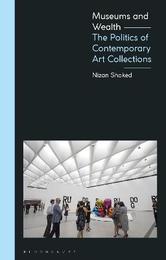
|
Museums and Wealth: The Politics of Contemporary Art Collections
Hardback
Main Details
| Title |
Museums and Wealth: The Politics of Contemporary Art Collections
|
| Authors and Contributors |
By (author) Nizan Shaked
|
| Physical Properties |
| Format:Hardback | | Pages:288 | | Dimensions(mm): Height 216,Width 138 |
|
| Category/Genre | The arts - general issues
Philosophy - aesthetics
Social and political philosophy
Political economy |
|---|
| ISBN/Barcode |
9781350045750
|
| Classifications | Dewey:708 |
|---|
| Audience | | Tertiary Education (US: College) | |
|---|
|
Publishing Details |
| Publisher |
Bloomsbury Publishing PLC
|
| Imprint |
Bloomsbury Academic
|
| Publication Date |
10 February 2022 |
| Publication Country |
United Kingdom
|
Description
A critical analysis of contemporary art collections and the value form, this book shows why the nonprofit system is unfit to administer our common collections, and offers solutions for diversity reform and redistributive restructuring. In the United States, institutions administered by the nonprofit system have an ambiguous status as they are neither entirely private nor fully public. Among nonprofits, the museum is unique as it is the only institution where trustees tend to collect the same objects they hold in "public trust" on behalf of the nation, if not humanity. The public serves as alibi for establishing the symbolic value of art, which sustains its monetary value and its markets. This structure allows for wealthy individuals at the helm to gain financial benefits from, and ideological control over, what is at its core purpose a public system. The dramatic growth of the art market and the development of financial tools based on art-collateral loans exacerbate the contradiction between the needs of museum leadership versus that of the public. Indeed, a history of private support in the US is a history of racist discrimination, and the common collections reflect this fact. A history of how private collections were turned public gives context. Since the late Renaissance, private collections legitimized the prince's right to rule, and later, with the great revolutions, display consolidated national identity. But the rise of the American museum reversed this and re-privatized the public collection. A materialist description of the museum as a model institution of the liberal nation state reveals constellations of imperialist social relations.
Author Biography
Nizan Shaked is Professor of Contemporary Art History, Museum and Curatorial Studies, College of the Arts, California State University, Long Beach, USA.
Reviews"Is there such a thing as a 'before' and 'after' in museum scholarship? Nizan Shaked's Museums and Wealth would be an example. This is a unique, dialectical study of the art museum, the practise of collecting, and the creation of value in art in contemporary capitalism (racial and gendered, as we know it). It is also an acutely critical reflection on why it is so hard for emancipatory politics to change the field, yet it offers hope about how to move forward. And finally, this book is a lesson on methodology, in ways that will make it indispensable to researchers in contemporary art theory, museum studies, curatorial theory and the history of collecting. Shaked exposes 'philanthrocapitalism' as a system that privatises in fairly specific ways the social value of art while she builds a nuanced argument on the reproduction of white supremacy in museums. Moving between case studies and the big picture, Museums and Wealth is an extraordinary contribution to the struggle for an egalitarian (art) world." --Angela Dimitrakaki, University of Edinburgh, UK "Finally, a book that does the heavy lifting of querying the obfuscated connection between economic and aesthetic value, addressing a blind spot in the critique of institutions. Shaked gives a solid account of the complicated entwinement of the art market and the exponential growth in the financial sector of first world economies that increasingly rely on debt rather than on actual production. She explains why, over the last thirty years, the art world has become little more than a hedge fund working for the interests of the wealthiest class. The latter development, as she demonstrates, explains the mushroom cloud like quantitative expansion of contemporary art practices in proportion to its concomitant fall and contraction in quality and creative risk. She also traces the social worlds that gather around venal self-interest masquerading as professional "sacrifice for the team." I cannot recommend this book highly enough for programs in critical curatorial studies." --Jaleh Mansoor, Associate Professor, The University of British Columbia, Canada "This book issues a profound challenge to almost every aspect of the capitalist art world, revealing how many practices that are technically legal are nevertheless contrary to the public good. It offers a radical and specifically-targeted critique, surpassing the usual vague complaints over the commodification of art. It achieves a link between the critique of white supremacy (which has had a profound effect on the art world in recent years) and an economic critique of capitalism that has sometimes, if misguidedly, been opposed to "identity politics." The defense of a Marxist "totalizing" perspective precisely for the purpose of abolitionist anti-racist work could not be more important in this moment. Although the solutions proposed may seem almost impossibly out of reach at present, so too did the idea of defunding the police just a year ago, as the author points out. This book looks beyond incremental reforms to a thorough restructuring of the art/museum world, or rather of society itself, which is indeed what it would take to achieve the seemingly more modest goal of making museums truly serve the public." --Daniel Spaulding, Assistant Professor Of Modern And Contemporary Art, University of Wisconsin - Madison, USA
|